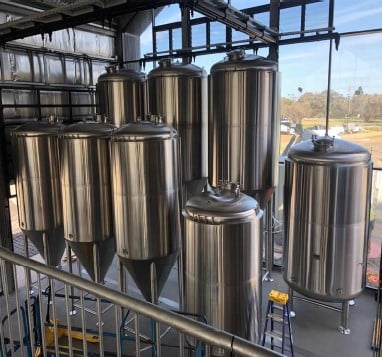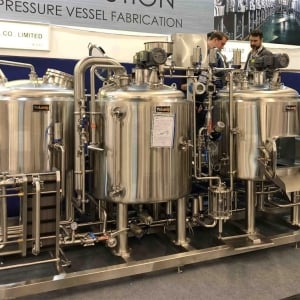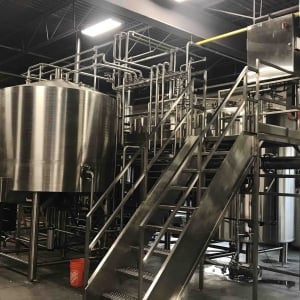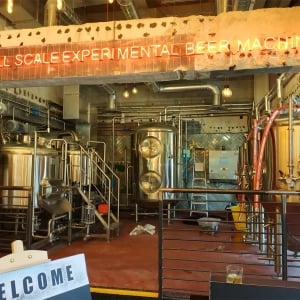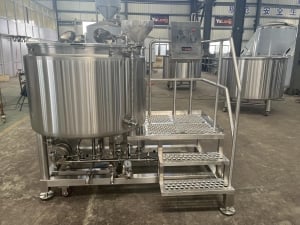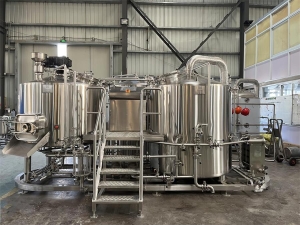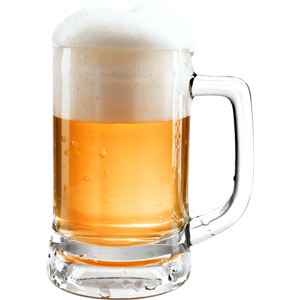Table of Contents
ToggleWhat is an Automatic Brewing System?
An automatic brewing systemTraditionally, brewing was a manual and often labor-intensive task, but with the advent of modern technology, many aspects of brewing can be automated, ensuring consistency, efficiency, and optimal results.
The Components of Automatic Brewing Systems:
- Controller: The brain of the system, which can be programmed to execute specific brewing tasks.
- Heating Element: Ensures the water or brew reaches the right temperature.
- Pumps: To move the liquid from one vessel to another.
- Sensors: Monitors various parameters like temperature, pressure, and pH.
- Vessels: Containers such as kettles, mash tuns, and fermenters.
The rise in the popularity of homebrewing and the need for consistent quality in commercial brewing has led to a surge in the demand for automatic brewing systems.
| Feature | Function |
|---|---|
| Programmable Logic | Enables customization of the brewing process. |
| Automatic Cleaning | Reduces the manual labor required after brewing. |
| Data Storage | Allows for recalling specific brewing recipes. |
| Precision Control | Ensures the optimal environment for brewing. |
Trends in Automatic Brewing Systems:
- Connectivity: Modern brewing systems can often connect to Wi-Fi, allowing users to monitor and control their brew remotely through a smartphone or computer.
- Eco-Friendly Designs: Manufacturers are more conscious about sustainability, leading to energy-efficient designs.
- Integration with AI: Some advanced systems use artificial intelligence to perfect the brewing process, learning from previous batches to improve results.
In conclusion, automatic brewing systems are revolutionizing the way beverages are brewed, offering a blend of traditional methods and modern technology. These systems cater to both novice brewers and experienced professionals, promising a hassle-free brewing experience.
How Much Does an Automatic Brewing System Cost?
Automatic brewing systems, much like any technology, vary in price depending on their features, brand, capacity, and other factors. Whether you’re a homebrew enthusiast or a commercial brewer, it’s essential to understand the cost breakdown to make an informed purchasing decision.
Factors Influencing the Cost:
- Capacity: Systems designed for personal use are usually cheaper than those for commercial purposes due to their smaller size.
- Features: Advanced features like AI integration, remote control, and high-level programmability can increase the cost.
- Brand Reputation: Established brands often come with a higher price tag due to their trusted quality and customer service.
Here is a table showcasing a range of brewing systems across various price points:
| Brand Name | Model | Price Range | Key Features |
|---|---|---|---|
| BrewMaster | HomeBrew Pro | $400 – $800 | Wi-Fi connectivity, 5-gallon capacity |
| BrewTech Solutions | CommercialMaster 50 | $5,000 – $10,000 | 50-gallon capacity, Advanced sensors |
| PrecisionBrew | EliteBrew | $1,200 – $1,800 | AI integration, 10-gallon capacity |
| Everyday BrewWorks | BrewMate | $200 – $500 | Basic features, 3-gallon capacity |
| MegaBrew Industries | MegaBrew Pro | $10,000 – $20,000 | Commercial, 100-gallon capacity |
Getting the Best Value for Money:
While price is a significant factor, it’s essential to consider the value offered by the system. A cheaper unit might save upfront costs but may lack essential features or durability. In contrast, spending more might get you advanced features that can improve the brewing experience and the final product’s quality.
Warranty and Post-Purchase Support:
When investing a considerable sum in an automatic brewing system, ensure the product comes with a robust warranty and efficient post-purchase support. Some brands offer extended warranties, online support, or even on-site assistance, which can be crucial if you face any issues.
Used Systems:
For those on a tight budget, considering used or refurbished systems might be a viable option. Several platforms and forums connect buyers and sellers, but ensure the system is in good working condition and has been well-maintained.

What are the Types of Automatic Brewing Systems?
Automatic brewing systems have become popular among both commercial and home brewers. They offer the allure of convenience, precision, and replicability. As the demand has grown, so have the types and variations of these systems. Let’s delve into the primary categories of automatic brewing systems available in the market today.
1. Homebrewing Systems:
Designed primarily for personal use, these systems cater to enthusiasts who want to dabble in brewing without investing in large-scale equipment. They have smaller capacities, usually ranging from 1-10 gallons. Some popular brands include:
- PicoBrew
- Grainfather
- Brewie
Price Range: $200 – $2,000
2. Commercial Brewing Systems:
Crafted for larger scale operations such as microbreweries or pubs, these systems can handle large quantities of brew, often starting from 50 gallons and going up to several hundred gallons.
| Brand | Capacity | Price Range | Key Features |
|---|---|---|---|
| BrewTech | 50-200 gal | $5,000 – $50,000 | Programmable logic, advanced sensors |
| ProBrew | 100-500 gal | $20,000 – $200,000 | High-speed brewing, energy efficiency |
3. Specialty Brewing Systems:
These systems are tailored for specific beverages like coffee or tea, rather than the more traditional beer brewing systems. For instance:
- Keurig for coffee
- Breville’s tea makers
Price Range: $50 – $500
4. Advanced Systems with AI Integration:
The pinnacle of brewing technology, these systems use artificial intelligence to perfect the brewing process. They adjust variables based on previous batches, ensuring a consistent quality brew every time.
Price Range: $1,500 – $10,000
5. Modular Brewing Systems:
These systems offer flexibility, allowing brewers to add or remove components based on their needs. For instance, a brewer might start with a basic setup and then add more vessels or advanced sensors as they become more proficient.
Price Range: $500 – $10,000
Functions of Automatic Brewing Systems
The evolution of brewing has brought us to a point where technology can handle many tasks that once required manual labor and expertise. Automatic brewing systems, in their essence, are designed to simplify the brewing process while enhancing the quality and consistency of the final product. Let’s explore the fundamental functions these systems perform.
1. Automated Mashing:
This is where the magic begins. The system automates the process of mixing water with malted grains, ensuring that the mixture reaches and maintains the correct temperature for enzymes to convert starches into sugars.
2. Precise Temperature Control:
Temperature plays a crucial role in brewing. Automatic systems come equipped with sensors that monitor and adjust the temperature to maintain the optimal environment for fermentation and other brewing stages.
3. Efficient Wort Boiling:
Post mashing, the wort needs to be boiled, typically with hops, to develop flavor and set the stage for fermentation. Automated systems streamline this process, ensuring consistent boiling times and temperatures.
4. Scheduled Hopping:
Hops can be added at various stages of the boil to achieve different flavor profiles. Advanced systems can be programmed to add hops at predetermined times, ensuring consistency and precision.
5. Automated Cooling:
Once boiling is complete, the wort must be cooled quickly to a temperature suitable for yeast. Automatic systems often include integrated cooling mechanisms to expedite this step efficiently.
6. Controlled Fermentation:
The yeast’s role is to consume sugars and produce alcohol. Automatic systems often include fermentation chambers with controlled temperatures, ensuring that the yeast thrives and produces the desired alcohol content and flavor profiles.
By integrating these functions, automatic brewing systems provide a seamless and consistent brewing experience, removing much of the guesswork and potential for error from the process.
Applications of Automatic Brewing Systems
Automatic brewing systems, since their inception, have continued to grow in popularity and application. Both novice and professional brewers appreciate their convenience and precision. The applications of these systems span various sectors and scales. Let’s explore these applications in-depth.
1. Homebrewing:
Automatic brewing systems have revolutionized homebrewing. These systems are compact, easy to use, and designed to fit into a home setting. Avid enthusiasts can now create their unique brews with minimal hassle.
2. Microbreweries:
Microbreweries focus on producing beer in relatively small quantities, often with an emphasis on quality, flavor, and unique recipes. Automatic brewing systems allow these breweries to maintain consistency across batches, ensuring loyal customers always get the beer they love.
3. Restaurants and Pubs:
Several restaurants and pubs have incorporated in-house brewing to offer fresh and unique beer varieties to their customers. Automatic systems make this possible without requiring significant brewing expertise on the premises.
4. Coffee Shops:
Beyond beer, there are automatic brewing systems designed specifically for coffee. Coffee shops utilize these to offer a wide variety of freshly brewed coffee, ensuring consistent taste and quality.
5. Educational Institutions:
Brewing courses and workshops have become increasingly popular. Automatic systems in educational settings provide hands-on experience for students while ensuring safety and consistency.
6. R&D Labs in Beverage Companies:
Large beverage companies often have R&D labs to experiment with new flavors and products. Automatic systems allow for precision, ensuring that once a product is finalized, it can be replicated at scale in production units.
7. Specialty Beverage Markets:
From teas to kombuchas, the specialty beverage market is booming. Automatic brewing systems cater to these niche markets, ensuring that producers can meet demand without compromising on quality.
8. Brewing Workshops and Events:
Pop-up events or workshops focused on brewing have become popular. Here, participants can use automatic systems to try their hand at brewing, without needing extensive training or experience.
Automatic brewing systems have broadened the horizons of brewing, making it accessible and efficient across various applications. As technology continues to advance, the scope and reach of these systems are bound to expand further.
How Automatic Brewing Systems Benefit You?
Automatic brewing systems have changed the face of brewing, whether it’s beer, coffee, tea, or other beverages. These systems have been met with enthusiasm from both novice home brewers and commercial operations. But why? Let’s delve into the myriad benefits these systems offer.
1. Consistency is King:
One of the primary challenges brewers face is achieving a consistent flavor profile batch after batch. Automatic brewing systems, with their programmable logic and precise control mechanisms, ensure that every brew follows the exact same steps, timings, and temperatures, leading to a consistently high-quality beverage.
2. Time-Saving:
Traditional brewing methods, while romanticized, can be labor-intensive and time-consuming. The automation provided by modern brewing systems significantly reduces the hands-on time required, allowing brewers to focus on other tasks or even start multiple brews simultaneously.
3. Reduced Margin for Error:
Human error, such as incorrect measurements or missing a step, can adversely affect the final product. With automated processes, the chances of such mistakes are minimized. The system follows a pre-programmed method, ensuring every step is executed correctly.
4. Scalability:
For commercial brewers, scalability is a concern. If a particular brew gains popularity, the demand might necessitate increased production. Automatic systems can handle larger batches with the same precision as smaller ones, allowing operations to scale up seamlessly.
5. Data Collection and Analysis:
Many advanced systems come equipped with data logging capabilities. They record details of each brew, from temperatures and timings to ingredient quantities. This data can be invaluable for refining recipes, troubleshooting issues, or even for regulatory and quality control purposes.
6. Enhanced Safety:
Brewing involves processes that can be potentially hazardous, such as dealing with boiling liquids or pressurized vessels. Automatic systems often come with built-in safety features like alarms, auto-shutoff mechanisms, and safety valves, reducing the risk of accidents.
7. Cost Efficiency in the Long Run:
While the initial investment for an automatic brewing system can be substantial, the efficiencies it brings in terms of time, ingredient usage, and reduced wastage can lead to cost savings in the long run, making it a worthwhile investment for many.
How to Choose an Automatic Brewing System?
The market for automatic brewing systems is expansive and offers a multitude of options for both amateur and seasoned brewers. However, choosing the right system for one’s specific needs can be overwhelming. Here’s a step-by-step guide to help navigate the choices and make an informed decision.
1. Define Your Needs:
Start by understanding why you need the system. Is it for personal or commercial use? What kind of beverages are you planning to brew? How frequently? The answers to these questions will influence your choice.
2. Set a Budget:
There’s a broad price range when it comes to brewing systems, so setting a budget can help narrow down options. However, remember that sometimes paying a little more can provide significantly better features or durability.
3. Check Capacity:
For home brewers, a 5-gallon system might suffice, but commercial operations may require systems that handle hundreds of gallons. Choose a system that aligns with your brewing volume needs.
4. Evaluate Features:
List out essential features you desire, such as programmability, data logging, or remote control capabilities. It’s also beneficial to check if the system is upgradeable, allowing for future feature additions.
5. Brand Reputation and Reviews:
Brands with a strong reputation often provide reliable products and better after-sales support. Additionally, user reviews can offer insights into the system’s performance, durability, and any potential issues.
6. Warranty and Support:
A robust warranty can be indicative of the manufacturer’s confidence in the product. Additionally, brewing systems are intricate machines, so access to efficient customer support can be crucial.
To aid in this decision-making, here’s a table of popular brewing systems catering to different needs:
| Brand | Model | Capacity | Price Range | Features |
|---|---|---|---|---|
| BrewMate | HomeBrew | 5 gallons | $400 – $800 | Basic, suited for beginners |
| ProBrew | Elite 50 | 50 gallons | $10,000 – $15,000 | Commercial, advanced sensors |
| CoffeeGenius | ProBrewCoffee | 2 gallons | $200 – $500 | Designed for coffee, programmable |
Remember, the best brewing system for you is one that meets your specific requirements, offers good value for money, and provides a consistent brewing experience.
Best 10 Automatic Brewing System Manufacturers
With the surge in popularity of brewing, numerous manufacturers have ventured into the automatic brewing system market. They range from established giants to innovative startups, each bringing their unique offerings to the table. Let’s dive into the top ten manufacturers that have garnered acclaim in this domain.
1. BrewTech Solutions:
- Key Offerings: Advanced commercial systems, data analytics, and AI-driven processes.
- Price Range: $5,000 – $50,000
2. PicoBrew:
- Key Offerings: Compact systems ideal for homebrewing, with an emphasis on user-friendliness.
- Price Range: $500 – $2,000
3. Grainfather:
- Key Offerings: Detailed control, suited for both novice and advanced brewers.
- Price Range: $800 – $2,500
4. Brewie:
- Key Offerings: Automated homebrewing systems with a wide array of customizable options.
- Price Range: $1,500 – $3,000
5. Keurig:
- Key Offerings: Coffee brewing systems that prioritize speed and convenience.
- Price Range: $50 – $200
6. Breville:
- Key Offerings: Specialty beverage systems, including coffee and tea brewers.
- Price Range: $100 – $1,000
7. BrewMaster Inc.:
- Key Offerings: Commercial systems with modular components, allowing for easy scaling.
- Price Range: $10,000 – $100,000
8. CoffeeGenius:
- Key Offerings: High-quality coffee brewing systems with programmable features.
- Price Range: $200 – $800
9. ProBrew Systems:
- Key Offerings: High-capacity systems ideal for microbreweries and larger operations.
- Price Range: $5,000 – $150,000
10. BrewBots:
- Key Offerings: AI-integrated systems that learn and adapt to brewing preferences over time.
- Price Range: $2,000 – $10,000
While each of these manufacturers has its strengths and specializations, potential buyers should prioritize their unique needs and preferences when selecting a brand and product. Whether it’s capacity, features, price, or brand reputation, the perfect fit is out there waiting for you.
Where to Buy Automatic Brewing Systems?
In the modern age, access to high-quality automatic brewing systems has never been easier. Both brick-and-mortar shops and online platforms provide a plethora of options for potential buyers. However, the challenge lies in determining the most reliable and convenient places to make these purchases. Let’s explore the various avenues available to prospective buyers.
1. Specialized Brewing Stores:
Most cities have specialty stores catering exclusively to brewing enthusiasts. These stores often provide a range of equipment, from basic homebrewing kits to advanced commercial systems. A significant advantage of such establishments is the ability to physically inspect products and seek expert advice.
2. Online Retail Giants:
Platforms such as Amazon, Alibaba, and eBay have numerous listings for brewing systems. The vast array of choices, user reviews, and often competitive prices make these platforms appealing. However, it’s crucial to buy from reputable sellers to ensure product authenticity.
3. Direct From Manufacturers:
Several manufacturers allow direct purchases from their websites or sales offices. This method ensures authenticity and often provides the latest models. Companies like YoLong Brewtech, based in Ningbo City, China, offer such direct sales, ensuring customers receive top-notch, custom-designed equipment tailored to their specifications.
4. Industry Expos and Conventions:
Regularly, brewing industry events are held worldwide. Such events provide an opportunity to see the latest innovations, meet manufacturers, and often avail of expo-exclusive discounts.
5. Local Microbreweries:
Sometimes, local microbreweries upgrade their equipment and sell their older systems. Though second-hand, these systems can be in excellent condition and come at a fraction of the price of a new one.
6. Custom Orders from Overseas:
For those looking for specific features or sizes, placing custom orders from manufacturers overseas might be the best option. For instance, YoLong Brewtech in China is renowned for its high-quality brewing equipment, catering to various beverages like beer, cold brewed coffee, kombucha, and more. With over 15 years of experience and a state-of-the-art manufacturing plant, they can meet almost any specification required.
Product Advantages of Chinese Automatic Brewing Systems
China, being a global manufacturing hub, has a rapidly growing brewing equipment industry. Over the years, Chinese manufacturers have stepped up their game, now producing some of the world’s best automatic brewing systems. Let’s delve into the various advantages of these systems.
1. Competitive Pricing:
Due to economies of scale and efficient manufacturing practices, Chinese brewing systems often come at a fraction of the price compared to Western counterparts, without compromising on quality.
2. Advanced Technology Integration:
Many Chinese manufacturers, such as YoLong Brewtech, have integrated cutting-edge technology into their products, from AI-driven processes to advanced sensor systems.
3. Customization:
Companies like YoLong Brewtech prioritize customer specifications. Their large manufacturing facility in Ningbo City ensures every custom-designed project is tailored to exact customer requirements.
4. Global Standards Compliance:
Modern Chinese brewing systems are designed and manufactured adhering to global quality and safety standards, ensuring their products are universally compatible and reliable.
5. Wide Product Range:
From systems for brewing beer to equipment for cold-brewed coffee and kombucha, Chinese manufacturers offer a comprehensive range of products catering to diverse needs.
6. Strong Post-Sale Support:
Post-sales support, including warranty, maintenance, and spare parts availability, has seen significant improvement, with manufacturers keen on building long-term relationships with customers.
7. Rapid Innovation:
With a fast-paced R&D approach, Chinese manufacturers are quick to adapt to industry trends, constantly refining and improving their product offerings.
8. Global Reach:
Chinese brewing system manufacturers have established a global distribution network, ensuring their products are accessible to customers worldwide.
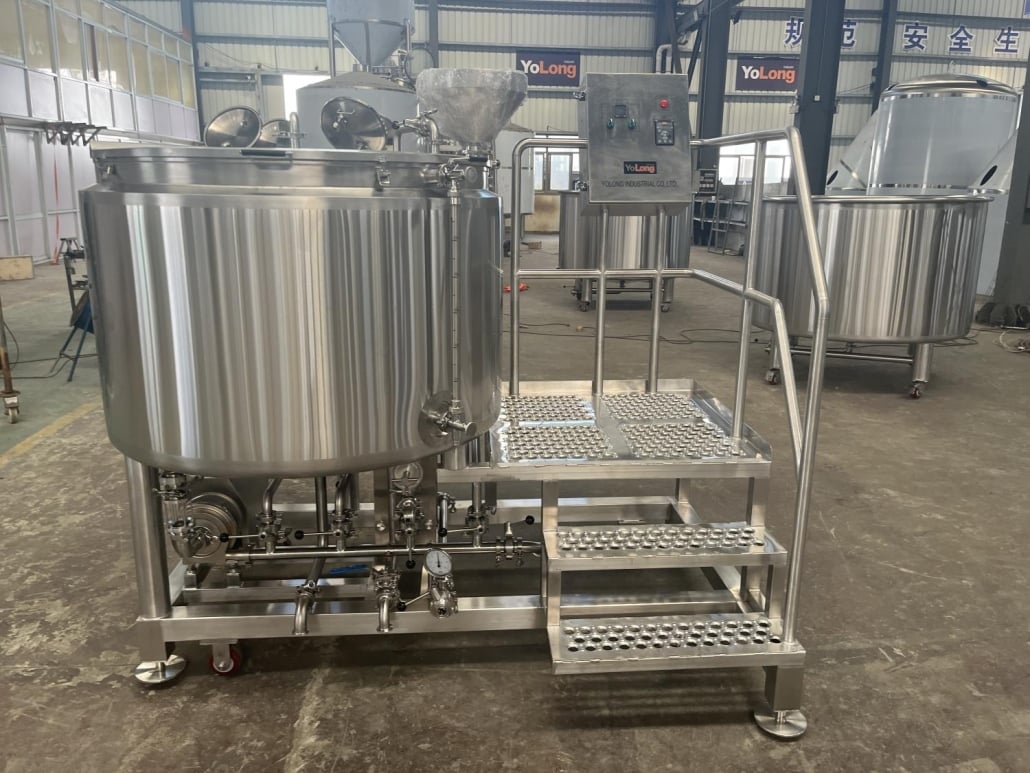
Best Chinese Automatic Brewing System Supplier: A Spotlight on YoLong Brewtech
When it comes to brewing equipment, YoLong Brewtech stands out as one of China’s leading suppliers. With a rich history and commitment to excellence, this company has been setting industry standards for over a decade.
1. A Rich Legacy:
Founded in 2004, YoLong Brewtech has amassed over 15 years of experience in the brewery equipment manufacturing domain. Such extensive experience speaks volumes about the company’s reliability and expertise.
2. Diverse Product Offerings:
From beer to wine and kombucha, YoLong’s portfolio caters to a range of beverages. Their deep understanding of different brewing processes ensures each product is optimized for its specific purpose.
3. State-of-the-Art Facility:
Nestled in the Ningbo City Economic Development Zone, YoLong’s 36,000 m2 manufacturing plant is equipped with the latest tools and technologies. This facility ensures that every project, be it custom-designed or pre-made, is executed with precision.
4. Dedication to Quality:
Quality is at the core of YoLong’s values. Their team, comprising experienced professionals, ensures each product meets global quality and safety standards.
5. Customer-Centric Approach:
Understanding that every brewer’s needs are unique, YoLong places immense emphasis on customization. Their capability to meet virtually any customer specification is testament to their flexibility and commitment.
With such attributes, it’s evident why YoLong Brewtech has emerged as an industry leader not only in China but on the global stage. For those looking to invest in top-tier brewing equipment, YoLong Brewtech should undoubtedly be on the consideration list.
FAQ
Q1: What is an Automatic Brewing System?
An automatic brewing system is a device or set of devices that automates the various stages of the brewing process. This can include processes such as mashing, boiling, fermenting, and bottling, allowing for more consistent results and often a more streamlined brewing experience.
Q2: How do I maintain and clean my Automatic Brewing System?
Regular maintenance and cleaning are essential to ensure the longevity of the system and the quality of the brew. Most systems come with a manufacturer’s guide that provides detailed instructions on cleaning and maintenance. It’s typically recommended to clean the system after every brew.
Q3: Can I brew different types of beverages with the same system?
Yes, many automatic brewing systems are versatile and can brew a variety of beverages, from beer to kombucha, cold-brewed coffee, and more. However, it’s crucial to clean the system thoroughly between different brews to prevent cross-contamination.
Q4: Is brewing with an Automatic System as good as traditional methods?
Automatic brewing systems are designed to provide consistency, which can be challenging to achieve with manual methods. While some purists believe traditional methods offer more control, many brewers find that automatic systems deliver high-quality brews with the added benefit of convenience.
Q5: How energy-efficient are Automatic Brewing Systems?
Energy efficiency varies between models and manufacturers. However, many modern systems are designed with energy conservation in mind. It’s always a good idea to check the system’s specifications or consult with the manufacturer directly.
Q6: Are there any safety concerns associated with Automatic Brewing Systems?
Most modern brewing systems are designed with safety features to prevent issues like overheating or over-pressurization. However, as with any appliance, it’s essential to follow the manufacturer’s guidelines and ensure the system is used in a safe environment.
Q7: How long does the warranty typically last for these systems?
Warranty periods can vary significantly between manufacturers and models. While some might offer a one-year warranty, others might provide extended warranties of up to 5 years or more. Always check the warranty details before making a purchase.

